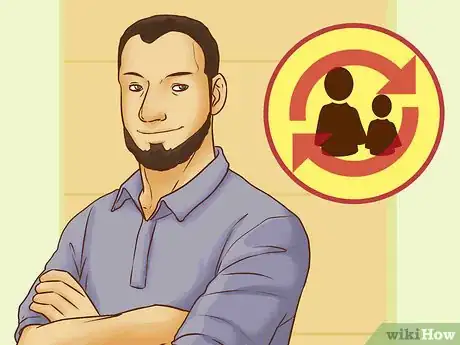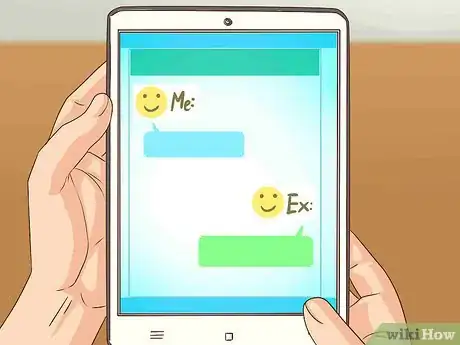This article was co-authored by Jacob Christenson, PhD, LMFT. Dr. Jacob Christenson is a Licensed Marriage and Family Therapist and the CEO of Covenant Family Solutions. With more than 20 years of experience, he specializes in substance abuse issues, parenting, medical family therapy, couples counseling, family therapy, and counseling for treatment-resistant adolescents. Dr. Christenson has also been published in many peer-reviewed journals, including Contemporary Family Therapy: An International Journal and Journal of Marital and Family Therapy. He is an AAMFT Approved Supervisor for the American Association for Marriage and Family Therapy (AAMFT) and a Clinical Fellow for the Iowa Association for Marriage and Family Therapy (IAMFT). Dr. Christenson holds a BS in Psychology from California Polytechnic State University, an MS and PhD in Marriage and Family Therapy from Brigham Young University, and an MBA from The University of the People.
There are 19 references cited in this article, which can be found at the bottom of the page.
This article has been viewed 97,158 times.
A separation can be difficult in its own right. The involvement of a child adds all sorts of additional considerations that can cause serious tension for everyone involved. When a child is in the picture, you can’t make a clean break with your ex and need to maintain some kind of relationship. Even in an exceptionally acrimonious separation, you can cut through the tension by remaining focused on your child and their best interest. You also need to consider how you communicate with your child and make sure your behavior provides consistency, support, and affection for them.
Steps
Maintaining a Positive Relationship with Your Ex
-
1Learn to forgive. You may have a lot of personal issues with your ex and your feelings remain valid, even after the relationship is over. However, now that you’re separated, you need to take a pragmatic view that places your child above all else. Learn to forgive your ex from their transgressions, even if they haven’t apologized.
- To thoroughly forgive them, you’ll need to take a mental inventory of what makes you angry at your ex. Simply ignoring your feelings will not be a permanent solution as your anger will likely swell up again in the future when you’re reminded of your differences.
- Do your best to see things from their perspective. Acknowledging your own faults may be difficult but can help you empathize.
- Considering aspects of their personality or history that may explain, if not justify, their behavior can help as well. This will make it easier to forgive.
- It may help to speak with them, separate from your children, to work out past issues that are still bothering you. However, forgiveness is a function that you have sole control over. If speaking with your ex will only flare up animosities, work through your anger on your own.[1]
-
2Maintain a professional tone. You may have trouble separating your emotions from your custodial relationship with your ex. Try thinking of them as a colleague rather than a personal relationship with your ‘business’ being the care of your child. Speak professionally and stay focused on pragmatic goals.[2]
- Make requests rather than demands or statements of fact. Include reasonable explanations with your requests. For example, instead of saying “I need you to take the kids on Thursday nights,” ask “Would you be willing to take the kids on Thursday nights? My friends asked me to join a bowling league and I would like to do so.”
- Practice active listening to demonstrate to your ex that you are hearing them, understanding their perspective, and respecting of their point of view. Ask clarifying questions and maintain a sincere body language when speaking with them to perform active listening.[3]
- If needed, set boundaries to guide your communications, especially if you and your ex tend to argue. Communicating through text or email may keep you from getting caught up in personal emotions vs. chatting on the phone, for example.
Advertisement -
3Compliment their parenting. When you notice that your ex is going out of their way to provide excellent care for your children, tell them you appreciate it.[4] This is a great way to build on positive aspects of your relationship and keep the focus on your children.
- Say things like “I hear you did a great job with the bake sale last week,” or “I really appreciate you taking the kids to soccer practice.”
-
4Negotiate terms. If you are going through a legal divorce, you will have to go through negotiations to determine the provision of financial and material childcare and your scheduled share of time with the children. Whether you’re going through a legal separation procedure or not, it’s good to try and work out terms in an honest and pragmatic fashion.[5]
- The most essential considerations are schedules for custody and the provision of money for childcare. These issues can be extremely complex and you may need to involve a mediator or your own attorney to represent your interests. However, you should at least start with a personal conversation to determine your ex’s expectations on these matters and express your own.[6]
- With these most important issues, don’t sign any kind of legally binding agreement until you’ve had a lawyer look over it and advise you on the consequences.[7]
- Co-parenting successfully with an ex requires compromise from both parents. Try to stay flexible to keep things working well.
-
5Consider your child’s day-to-day. You need to consider things like PTA meetings and driving the kids to afterschool activities like sports. Consider all aspects of your child’s life and how the separation might affect them.
- You also need to consider how you’ll enforce discipline and what kind of rules you’ll apply to the kids. Prioritize consistency both in terms of before and after the separation and between your two households.[8]
-
6Leave legal issues with the lawyers. If there are areas of serious disagreement or issues that a judge has ruled as requiring adjudication like alimony payments or visitation, leave these out of your personal conversations. If you can’t resolve an issue, forcing a discussion about it will only cause unnecessary acrimony.
-
7Consider group counseling. Counselors are not only for couples but for anyone in a relationship, including co-parenting exes.[9] If you’re having exceptional difficulty working through your issues with your ex, you may want to bring a relationship therapist into the picture.[10]
- You may also want to consider counseling for your child if you think the separation is affecting their mood or behavior.[11]
Working Together as Parents
-
1Brainstorm about the best way to approach your kids. Sit down with your ex and discuss the most ideal and least damaging ways to confront details of the separation with your child. Tailor your communications to the age of the child and their level of understanding.[12]
-
2Break the news. While it may be tempting to protect your child from the events of your separation as much as possible, they will likely understand what is going on and failing to be forthright will only lead to confusion. This may be the most difficult part of your separation but breaking the news the right way could make things much easier going forward.[13]
- Try to have the conversation with the whole family present. Make time to answer any questions they have and be patient and thorough when explaining the situation to them.[14]
- Soften the initial shock of the situation. Start with something like “I don’t want you to worry. There is nothing to be afraid of.” If you think your child already has some understanding of the situation, you may want to ask what they think and then go from there.
- Explain that you and your ex have disagreements and want to separate to be the best parents possible. Emphasize that nothing has changed in terms of your love for the child.
-
3Maintain consistency. For your separation to have as little impact as possible on your child, you’ll want to maintain as much consistency in your parenting style and in their routine as you can. Consider not only the child’s schedule but your general attitude and demeanor as a parent. When in doubt about how to handle a parenting situation, ask yourself what you would have done before the separation.[15]
- Children need to have consistent rules and discipline before and after the separation. They also need to have consistency when they switch between households.[16]
- It may be tempting to shower you child with extra affection or gifts. Of course, you should always show your child a lot of affection and consider how difficult a separation will be for them. However, going overboard can signal a lifestyle change that makes your child uncomfortable or simply result in them feeling entitled to special treatment.[17]
- Minimize damage to your child during the separation by allowing them to have strong relationships with both parents, reducing their exposure to conflict when possible, and providing them with consistent parenting.[18]
-
4Maintain communications. You should be regularly speaking with your ex to discuss issues with related to your child.[19] Set up a regularly time to speak at least once a week, over the phone or in person. Always try to keep these discussions solely focused on your child and leave out
- It might help to establish one conversation that includes new relationships or step-guardians and one without them.
Communicating With Your Child
-
1Keep negative thought to yourself. No matter how upset you are, never involve your child in the animosity. Never assign fault to your ex for the separation. Speaking negatively about your ex will not only risk the child lashing out at them or you but will also cause the child serious tensions and a feeling of being torn between the two of you.[20]
- If you learn that your ex is speaking negatively about you in front of the child, be the bigger person and don’t retaliate in kind. Explain to your child that your ex is under pressure from the separation and is doing their best to get through it.[21]
-
2Compliment your ex. Almost as important as refraining from disparaging your ex is encouraging your child to see your ex in a positive light. Say nice things about your ex whenever possible to demonstrate to your child that the end of your romantic relationship has not ended your co-parenting relationship and respect for each other.[22]
- Encourage your child to appreciate the skills and parenting effort of your ex by saying things like “Isn’t your father’s cooking great?” or “Your mother did a great job coaching your little league team.”
-
3Encourage your child to respect your new ex’s new relationship. It can be difficult to adjust to seeing your ex with a new relationship but you’ll have to accept that this person will be a significant part of your child’s life. Your child is likely to take cues from your perception so showing your animosity toward them could lead your child to disrespect and resent them. This will not only cause stress for your ex and their new relationship but also for your child.
- Try to compliment the new relationship. Ask your child questions like “What is dad’s new girlfriend like?” and seem interested and impressed.
- Tell them explicitly that they need to respect the new relationship as an authority figure. Say something like “Remember, mom and her new husband are the adults of the house. Show them both the respect that you would show me.”
- If your child dislikes the new relationship, give them the chance to vent their frustration but encourage them to adapt to the new situation. Try to relate to them by saying something like “This is hard on me too.”
-
4Communicate directly with your ex. Using them as a messenger will put your child in the middle of your conflict and force them to feel the tension of your relationship. Unfortunately, this is a common mistake for separated parents that don’t want to deal directly with each other, but you don't have to make it too. Find more productive ways to communicate like email, phone, or even talking through lawyers.
Expert Q&A
-
QuestionHow do you co-parent when you hate your ex?
 Jacob Christenson, PhD, LMFTDr. Jacob Christenson is a Licensed Marriage and Family Therapist and the CEO of Covenant Family Solutions. With more than 20 years of experience, he specializes in substance abuse issues, parenting, medical family therapy, couples counseling, family therapy, and counseling for treatment-resistant adolescents. Dr. Christenson has also been published in many peer-reviewed journals, including Contemporary Family Therapy: An International Journal and Journal of Marital and Family Therapy. He is an AAMFT Approved Supervisor for the American Association for Marriage and Family Therapy (AAMFT) and a Clinical Fellow for the Iowa Association for Marriage and Family Therapy (IAMFT). Dr. Christenson holds a BS in Psychology from California Polytechnic State University, an MS and PhD in Marriage and Family Therapy from Brigham Young University, and an MBA from The University of the People.
Jacob Christenson, PhD, LMFTDr. Jacob Christenson is a Licensed Marriage and Family Therapist and the CEO of Covenant Family Solutions. With more than 20 years of experience, he specializes in substance abuse issues, parenting, medical family therapy, couples counseling, family therapy, and counseling for treatment-resistant adolescents. Dr. Christenson has also been published in many peer-reviewed journals, including Contemporary Family Therapy: An International Journal and Journal of Marital and Family Therapy. He is an AAMFT Approved Supervisor for the American Association for Marriage and Family Therapy (AAMFT) and a Clinical Fellow for the Iowa Association for Marriage and Family Therapy (IAMFT). Dr. Christenson holds a BS in Psychology from California Polytechnic State University, an MS and PhD in Marriage and Family Therapy from Brigham Young University, and an MBA from The University of the People.
Licensed Marriage and Family Therapist If you don't get along with your ex, it will be really hard to find common ground, but that's your role as parents. Always try to remember that you're both working on the best interest of the child and avoid trying to make the other parents' life miserable, or you'll lose sight of what is really important.
If you don't get along with your ex, it will be really hard to find common ground, but that's your role as parents. Always try to remember that you're both working on the best interest of the child and avoid trying to make the other parents' life miserable, or you'll lose sight of what is really important. -
QuestionDoes co-parenting get easier?
 Jacob Christenson, PhD, LMFTDr. Jacob Christenson is a Licensed Marriage and Family Therapist and the CEO of Covenant Family Solutions. With more than 20 years of experience, he specializes in substance abuse issues, parenting, medical family therapy, couples counseling, family therapy, and counseling for treatment-resistant adolescents. Dr. Christenson has also been published in many peer-reviewed journals, including Contemporary Family Therapy: An International Journal and Journal of Marital and Family Therapy. He is an AAMFT Approved Supervisor for the American Association for Marriage and Family Therapy (AAMFT) and a Clinical Fellow for the Iowa Association for Marriage and Family Therapy (IAMFT). Dr. Christenson holds a BS in Psychology from California Polytechnic State University, an MS and PhD in Marriage and Family Therapy from Brigham Young University, and an MBA from The University of the People.
Jacob Christenson, PhD, LMFTDr. Jacob Christenson is a Licensed Marriage and Family Therapist and the CEO of Covenant Family Solutions. With more than 20 years of experience, he specializes in substance abuse issues, parenting, medical family therapy, couples counseling, family therapy, and counseling for treatment-resistant adolescents. Dr. Christenson has also been published in many peer-reviewed journals, including Contemporary Family Therapy: An International Journal and Journal of Marital and Family Therapy. He is an AAMFT Approved Supervisor for the American Association for Marriage and Family Therapy (AAMFT) and a Clinical Fellow for the Iowa Association for Marriage and Family Therapy (IAMFT). Dr. Christenson holds a BS in Psychology from California Polytechnic State University, an MS and PhD in Marriage and Family Therapy from Brigham Young University, and an MBA from The University of the People.
Licensed Marriage and Family Therapist Co-parenting is a really difficult thing, but you can make it easier by recognizing that you can't control the other parent and that you may have to do some things on your own that you consider important and that the other person doesn't care about. You may need to just see yourself as a single parent and get things done, free of expectations.
Co-parenting is a really difficult thing, but you can make it easier by recognizing that you can't control the other parent and that you may have to do some things on your own that you consider important and that the other person doesn't care about. You may need to just see yourself as a single parent and get things done, free of expectations.
References
- ↑ http://www.kars4kids.org/blog/8-keys-for-co-parenting-success-after-divorce/
- ↑ http://openpalmlaw.com/co-parenting-with-your-exblog/
- ↑ https://www.psychologytoday.com/blog/two-takes-depression/201203/the-dos-and-donts-co-parenting-well
- ↑ Jacob Christenson, PhD, LMFT. Licensed Marriage and Family Therapist. Expert Interview. 22 October 2021.
- ↑ http://farzadlaw.com/california-child-custody/parallel-parenting-plan-high-conflict/
- ↑ https://www.custodyxchange.com/custody/coparenting.php
- ↑ http://www.huffingtonpost.com/virginia-gilbert-mft/co-parenting_b_1540479.html
- ↑ http://www.divorceandchildren.com/coparenting-and-discipline/
- ↑ Jacob Christenson, PhD, LMFT. Licensed Marriage and Family Therapist. Expert Interview. 22 October 2021.
- ↑ http://www.boulderpsychologicalservices.com/counseling-for-co-parenting-issues/
- ↑ http://www.huffingtonpost.com/kate-scharff/divorced-children_b_3187252.html
- ↑ https://www.todaysparent.com/family/kids-and-divorce-an-age-by-age-guide/
- ↑ http://www.helpguide.org/articles/family-divorce/co-parenting-tips-for-divorced-parents.htm
- ↑ http://www.divorceandchildren.com/parenting-with-your-ex/
- ↑ https://www.empoweringparents.com/article/parenting-after-divorce-9-ways-to-parent-on-your-own-terms/
- ↑ http://kidshealth.org/en/parents/help-child-divorce.html
- ↑ https://mom.me/kids/6541-four-things-keep-stable-children-divorced-parents/
- ↑ https://www.todaysparent.com/family/kids-and-divorce-an-age-by-age-guide/
- ↑ Jacob Christenson, PhD, LMFT. Licensed Marriage and Family Therapist. Expert Interview. 22 October 2021.
- ↑ http://www.huffingtonpost.com/rosalind-sedacca/post-divorce-parenting_b_1421494.html
- ↑ http://www.lemonadedivorce.com/for-children/what-to-do-for-your-children-during-divorce/
- ↑ http://responsibledivorce.com/parenting/etiquette.htm
About This Article
To co-parent with an ex, start by talking with them one-on-one to work out any past issues. If you can’t resolve everything, you can still be civil when you see them. To do this, try making requests rather than demands. For example, instead of saying “I need you to take the kids on Thursday nights” try saying “Would you be willing to take the kids on Thursday nights?” Once you’ve started co-parenting, make sure to make a schedule of all of your child’s day-to-day activities so you don’t miss anything important. It’s also important to talk to your ex about your child at least once a week to discuss any issues they may be having. To learn how to talk to your child about the separation, read on.










































































